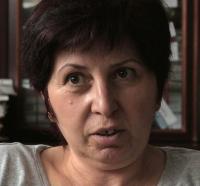In everyday life I am a normal woman, not a soldier
Ella Lazarevna Kesajeva was born on 1 September 1963 in the North Ossetian mountainous village of Chaznidon. The village is located in a fertile area and its inhabitants used to be fairly wealthy. During the Stalinist purges, most of the local men were executed by the NKVD and their property confiscated. This also happened to Ella Lazarevna’s grandfather. She was born to a Muslim family but is herself a Christian. To this day she identifies an anti-Muslim sentiment present in the area. She speaks both Russian and Digor, a dialect of Ossetian. She graduated in biology and worked as a head of a laboratory. Ever since the Beslan tragedy she has been engaged in its investigation. She attributes responsibility for the events to the governmental structures. Blaming the Ingush people who were held responsible for this and two other terrorist attacks is in her view an intentional incitement to hatred among the Caucasus nations. She has one daughter who is twenty-two years old and studies medicine. Her daughter survived the attack as a hostage present in the school. At the day of the attack, Ella’s daughter left for school along with her brother-in-law and his children. After a while, Ella Kesajeva heard gunshots. She lived close to school but couldn’t find her way through because it was blocked by a freight train. She saw a military vehicle arrive to the school; masked men jump out of it and start shooting. She ran around the school and saw no police units. She rushed towards the town hall trying to obtain a megaphone, intending to start negotiating with the terrorists and wondering why nobody is taking any action. Since they couldn’t get rid of her, the FSB let her stay in their office and draw a map of whatever she had seen. Policemen Gajdenko who intended to have her thrown out of the town hall later testified before court that he had never seen her. Another FSB officer whom she had met there later spied on her family. Her sister’s husband and their two children died during the attack.

